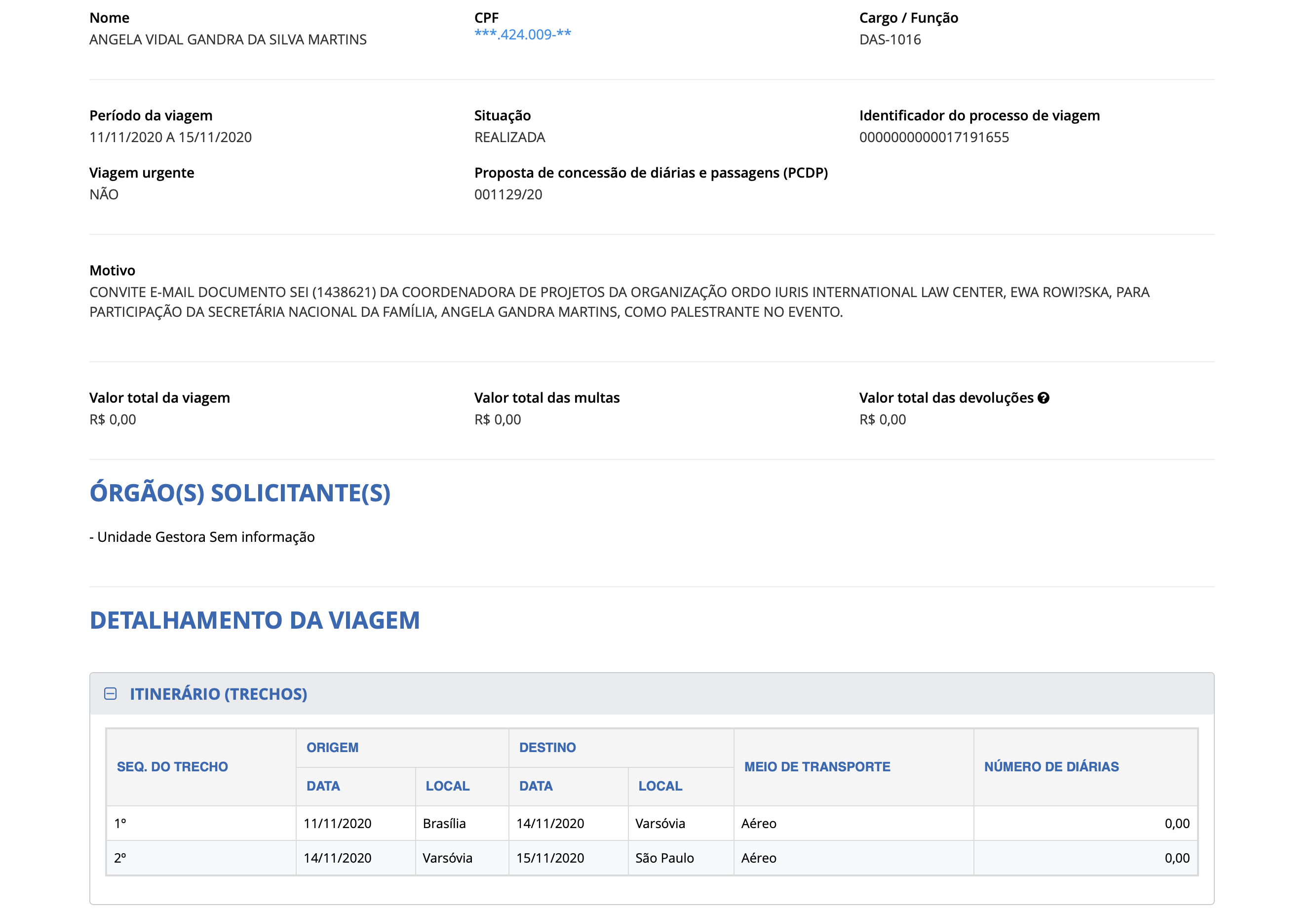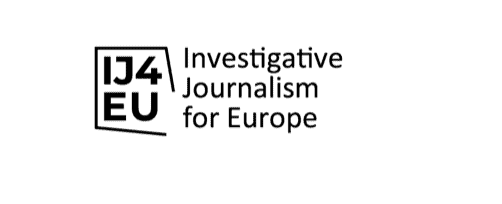As women in Poland stage mass protests against the country’s Constitutional Tribunal’s abortion ruling in the autumn of 2020, Angela Gandra, Brazil’s secretary of state for family affairs, arrives in Warsaw. She holds meetings with members of the government, politicians of Solidarna Polska (United Poland), and expresses her support for the abortion ban. The visit, which takes place amid raging pandemic, is sponsored by Ordo Iuris – one of the most influential ultra conservative organizations in Poland.
A story by Konrad Szczygieł (Fundacja Reporterów) and Juliana Dal Piva (UOL)
- The meeting at the Polish Ministry of Justice is attended by politicians representing United Poland (a right-wing party that is part of a ruling coalition) who meet Angela Gandra,
- Angela Gandra also visits the office of Ordo Iuris, where she is accompanied by an employee of the Brazilian Embassy; after her arrival, she holds an online meeting with Poland’s deputy minister of foreign affairs,
- Neither the Polish nor the Brazilian ministry pay for her trip to Warsaw; instead Ordo Iuris sponsors her European trip.
On November 13, 2020, a meeting is held at the Ministry of Justice between the politicians of United Poland (Michał Wójcik, Janusz Kowalski and Michał Woś) and Professor Angela Gandra, Brazil’s secretary of state for family at the country’s the Ministry of Women, Family and Human Rights.
The day before, Gandra had been a guest of honour at the Defending Women’s Rights Conference organised by Ordo Iuris. Brazil is an important place on the map of Catholic movements – it was from that South American country that members of what came to be known as the Kraków-based Skarga Foundation came to Poland. Later on, they founded Ordo Iuris.
Angela Gandra is a lawyer, her brother is a minister of the Superior Labor Court in Brazil – he and their father are both members of Opus Dei.
In January 2019, when the right-wing populist president Jair Bolsonaro took office, Gandra joined the government. She is formally responsible for addressing the problem of violence against minorities and women but also help victims of Brazil’s military dictatorship.
The conference attended by Brazil’s secretary of state was organised by Ordo Iuris in response to mass protests against the Constitutional Court’s abortion ruling (the conference organisers call the protests “riots”).
We have gained access to details of Gandra’s visit to Poland. We find them in the email exchange between Ordo Iuris and Brazil’s Ministry of Family Affairs. From the documents we have received, it appears that Brazil’s secretary of state’s trip to Poland was organised and paid for by Ordo Iuris.
On October 28, 2020, six days after the Constitutional Tribunal ruling, Ewa Rowińska, project coordinator at Ordo Iuris, sends an email to Gandra. “The scale of protests and street riots is unprecedented. There is [also] many disinformation and manipulation concerning the judgement of our Tribunal (…) This is why, we are thinking about organizing an international panel concerning women’s rights,” she adds. Rowińska then describes the rationale behind the move: “Our main goal is to show that the idea of women’s rights is now very manipulated and often leads to stigmatization of women who do not share it.” The institute is pressed for time – the issue is still a hot topic. “The conference will be held online on November 12, but if it’s possible we would be honoured if you would come to Poland. Of course, we will cover all costs related to the flight, hotel, etc.”
Despite the pandemic, Gandra decides to fly to Poland, although the other participants choose to talk to the conference participants on Zoom.
“We heard, the world has heard about the riots here, they make a lot of noise, but it is not a majority,” Gandra said during the conference. “There is a lot of money and big interests behind abortion”, and “this industry of sex and abortion – they dont care about people, because they put people into garbage, and they earn a lot of money”, she continued. According to Gandra, abortion comes from “hipersexualisation of the society”, while “sex and violence are destroying our culture.”
Apart from Brazil’s secretary of state for family affairs, the conference organised by Ordo Iuris was attended by Sharon Slater and Alix Leijard. In October 2020, both signed an opinion Amicus Curiae, which Ordo Iuris sent to the Constitutional Court. Their organisations – Family Watch International and French Femina Europa – were the official partners of the conference. Family Watch International is a controversial organisation that the US Southern Poverty Law Center (which monitors the activities of extremist movements and organisations in the US) has classified as promoting hate speech. Family Watch International is undertaking steps to combat “Western cultural imperialism,” and its main area of operation includes Africa and the United Nations. Slater has appealed to oppose UN efforts to decriminalise homosexuality. In some African countries, people suspected of being homosexual might face a prison or even death sentence.
Ministry of Ordo Iuris Affairs
At the Ordo Iuris office located in the historical PASTa high rise in Warsaw, Gandra not only debates abortion but also holds diplomatic meetings with representatives of the Polish government.
Gandra posts a photo on Instagram taken in the offices at the Ordo Iuris headquarters. It shows Brazil’s secretary of state, the Institute’s lawyers, and a representative of the Brazilian embassy holding an online meeting with Paweł Jabłoński, Poland’s deputy minister of foreign affairs (in 2016, he worked as an analyst at Ordo Iuris). There are also representatives of the ministry of family.
Wyświetl ten post na Instagramie.
“Deputy Minister of Foreign Affairs Paweł Jabłoński took part in the meeting (…) organised as VTC [videoconference] while he was in quarantine and working remotely. The meeting focused on international cooperation between Poland and Brazil and the exchange of practices in the area of social and pro-family policy” – this is how the press office at the Ministry of Foreign Affairs explained the rationale behind the meeting.
The press office at the Ministry of Family, on the other hand, wrote that “a representative of our department joined the meeting after being invited by another ministry. The nature of the ministry’s participation was limited only to being a guest at the said meeting.”
Was the Ministry of Foreign Affairs aware that the Brazilian politician was visiting Poland after Ordo Iuris invited her to Warsaw and paid for the trip? And what formula of international intergovernmental cooperation assumes that ministerial-level meetings are financed by private institutions? “The Ministry of Foreign Affairs does not ask representatives of other countries to present proof of purchase for airline tickets, hotel rooms and other expenses – this would be a gross violation of the rules that bind Poland in diplomatic relations,” the press office at the Ministry of Foreign Affairs has said.

The documents obtained at Brazil’s Transparency Office show no cost of return flight between Sao Paulo and Warsaw
It is unknown how much the trip cost – the documents obtained at Brazil’s Transparency Office show no cost of return flight between Sao Paulo and Warsaw (Gandra declared that the airline tickets cost USD 0 and that Ordo Iuris organised the visit). “The minister traveled economy class on a scheduled flight. The costs were covered using funds transferred by donors who supported public benefit activities that focus on, among other things, the protection of human rights,” says Maciej Grajewski, Ordo Iuris Communication Director.
When we reached out to Angela Gandra for comment about the details of her stay in Warsaw, she says that “she always travels economy class,” and that “in Poland, she stayed for two nights at her friends.”
We ask Poland’s former ambassador to the USA, Ryszard Schnepf, for his professional opinion. “It is against all rules, no doubts about that. The situation in which a Polish private organisation finances the visit of a government official of another country to meet government representatives should not take place. The line between what is private and what is public has become blurred,” he says.
An alliance against gender and sex education
During her stay in Poland, Gandra also meets, this time in person, a group of politicians who represent United Poland (a party in the ruling coalition). The meeting is held at the Ministry of Justice.
We asked Ordo Iuris if they had consulted representatives of the Ministry of Justice about Angela Gandra’s visit to Poland. “As far as we know, the Minister held meetings with representatives of Polish authorities, including representatives of the Ministry of Family, Ministry of Justice, Ministry of State Assets and Ministry of Foreign Affairs”, wrote Maciej Grajewski from Ordo Iuris.
“The Ministry of Justice organised a meeting that the Brazilian minister asked for. Apart from the minister herself, the delegation included a representative of the Brazilian embassy in Warsaw” – we read in a statement sent by the Ministry of Justice’s communication office.
Why did Janusz Kowalski, at the time deputy minister of state assets and Michał Wójcik, member of the Council of Ministers also participate in the meeting? “Minister Wójcik participated as a member of the Council of Ministers, which deals with the protection of civil rights” – the email we receive from the ministry’s press office reads.
“[Deputy] Minister [of State Assets Janusz] Kowalski attended the meeting because he is responsible for matters related to international cooperation. Contact with a representative of the Brazilian government is an opportunity to build a relationship that may open the field for Polish-Brazilian talks on economic cooperation,” answered the Ministry of State Assets. However, a few days ago Kowalski was dismissed due to the political conflict within the ruling coalition.
What else did the politicians of United Poland and Angela Gandra discuss? The Ministry of Justice says the conversation focused on “cooperation between Poland and Brazil on the international forum, for instance, within the UN or OECD in matters concerning the protection of human rights, in particular, the protection of the rights of children and the family.”
Indeed, Poland, allying with Brazil, Hungary and the USA, has successfully fought gender, abortion and sex education at the UN forum. In November 2019, at the UN summit in Nairobi, the group championed a successful effort to remove the statement “reproductive and sexual health and rights” from the UN position, because “it could be used to actively promote such practices as abortion.” Since December 2018, these four countries have also taken part in the “Partnership for Families”, an alliance whose “goal is to promote the family and pro-family policy in the international arena.”
The Alliance “Partnership for Families” is Angela Gandra’s hobbyhorse. Responding to questions about this international action Brazil’s secretary of state explains that “it is not a program, but a joint initiative between countries aimed at raising awareness to develop public policies that support the family and are based on reliable scientific and practical evidence developed at the level of government.”
On October 22, 2020, on the very same day when Polish women gathered in protest outside the country’s Constitutional Court, signatories of the Partnership for Families, allegedly acting to benefit women’s health and strengthen the family, signed a document drawn up by the Donald Trump’s administration, which called on UN countries to oppose the recognition of access to abortion as a human right (Geneva Consensus Declaration). After the election, Joe Biden withdrew US support for the declaration. The current signatories include the governments of Arab and African states, Brazil, and two isolated representatives of the EU – Poland and Hungary.
Julia Dauksza from Fundacja Reporterow contributed to this story.
Read in Polish: onet.pl
The production of this investigation was supported by a grant from the Investigative Journalism for Europe (IJ4EU) fund.
Konrad Szczygieł is an investigative journalist at FRONTSTORY.PL. Previously, he was a reporter at Superwizjer TVN and OKO.Press. Since 2016, he has worked with Fundacja Reporterów (Reporters Foundation). He was shortlisted for a Grand Press award (2016, 2021) and an Andrzej Woyciechowski award (2021). He is based in Warsaw.








